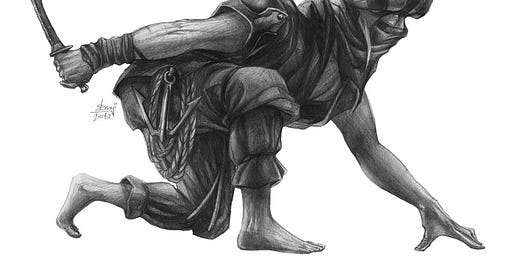As far back as the Blackmoor supplement for OD&D, Assassins have been part of fantasy roleplaying. However, I and many others like me have often been puzzled by this character class’s inclusion in the game. An assassin isn't a robust explorer or skilled in the kind of fighting that happens in a dungeon crawl. They have some Thief skills but most versions of the assassin make it clear that they are not as specialized in those skills as the Thief. More often than not, it seems like the Assassin is an odd man out and, well, he is. At least he is in the dungeon. The dungeon isn't all there is though. The Assassin is a kind of missing link to the Braunstein and his presence indicates that there is more to fantasy roleplaying than just dungeon crawling and exploration.
To begin, we have to discuss what an Assassin actually is in old-school roleplaying games. In AD&D 1e, the Assassin is a subclass of Thief. They required at least a score of 12 in strength, 12 in dexterity and 11 in intelligence. They could use any weapon but had the same armor restrictions as the Thief. They could perform Thief skills like climbing, pick-pocketing, etc but at 2 levels lower than their Assassin level. This is because thieving is listed as a tertiary function of the Assassin. Primarily, the Assassin is a killer and a spy. Assassins can not only use any weapon, but can also use poison and have a percentage chance to instantly kill (assassinate) any human, demi-human or humanoid monster that they surprise with an attack. They are also able to don disguises of humanoids of either sex and can even learn alignment languages other than their own. What does this tell us about the Assassin? His inability to perform his primary function, assassination, on non-human targets tells us that he’s not a total warrior the way a Fighter is. He’s not built for unseen movement to the degree that a Thief is either. In fact, I would argue that an Assassin is designed to be seen, but not seen for what he truly is. Assassins utilize social stealth in order to gain access to information and opportunities to kill their targets.
What this tells me is that Gygax, Arneson and the other early innovators of fantasy roleplaying had in mind that there would be social play and, by extension, a need for social stealth, intelligence gathering, and even targeted surgical killings. Think back to the first paragraph. The Assassin comes from the Blackmoor supplement originally. Anyone who’s seen the documentary Secrets of Blackmoor can tell you that Blackmoor comes directly out of the original Braunstein games organized by David Wesely. Considering the fact that those games were built around diplomacy and social interaction surrounding war in Napoleonic Germany. Assassination would be a potential tool that those players would have utilized and when Arneson adapted Braunstein into Blackmoor, that concept would naturally come with it. The existence of Assassins is evidence that diplomacy, domain play and politicking are central to the game especially at higher levels.
Moving into the realm of the game itself, Assassins and assassinations should be a looming threat as players get embroiled in faction play. Assassins will usually be freelancers working for an Assassin’s Guild. In fact, the AD&D 1e handbook requires membership in a guild for all Assassin PCs. What this means is that assassin NPCs and even PCs cannot be fully trusted. Players may even run into conflicts where the will of the guild will stand in opposition to the will of the party. Staying on the good side of the Assassin’s Guild will also be an obvious priority for the party. See John Wick 3 for what happens when an Assassin’s Guild turns against you. Assassination will also be an opportunity to curry favor with a faction. Rooting out would-be assassins or foiling attempts is a sure-fire way to earn trust. On the other side of things, players may seek to hire an assassin to take care of a problem or may attempt to carry out assassinations themselves. It's a high-stakes social encounter where failure can be met with a catastrophic reaction.
Assassins tie violence and diplomacy together in a unique way and serve as a link to the Braunstein roots of RPGs. If you have an Assassin in your party or just like the idea of recreating a Hitman level in your game, throw in a little bit of social stealth and cloak and dagger treachery. After all, it's part of the game




